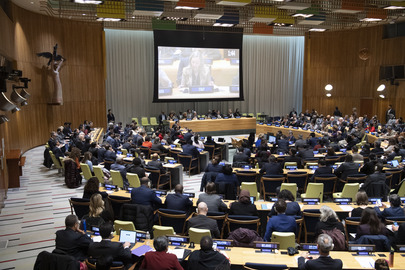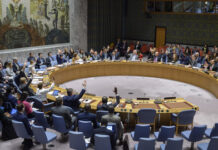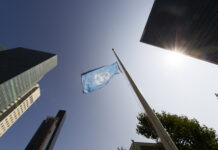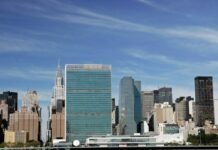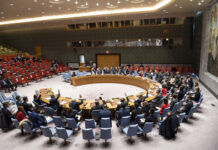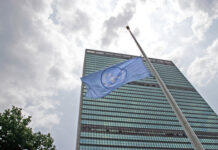The transcript has been edited for clarity and brevity.
Jan Hoffman: The Red Sea emergency is bad news for those who are directly affected. Of course, the sailors or the people in the region. But it also has wider implications for all the people who trade. And not just for those who trade through that route – and that is what I find fascinating about the global nature of shipping – not only is trade between Asia and Europe or the U.S. East Coast taking longer or becoming more expensive, but because of the impact on shipping prices globally, all the trades are affected. So also exports from China to, say, South America that do not go through the Red Sea, they are also becoming more expensive because, all of a sudden, we need more ships.
And the Red Sea crisis is compounded by another crisis that has been a little less in the news, which is the Panama Canal, which due to a shortage of water, which is linked to climate change, has fewer transits that it had one, two or three years ago. So, the two main canals for shipping both have fewer transits.
That means that ships have to go longer distances, which means we need more ships. And we do not have those ships. So, we saw shipping rates going up. We also saw stock market returns on shipping stocks going up, which may sound strange. You see it’s bad news for shipping, but at the same time, those who own stocks in shipping companies suddenly earn more because the value of the ships, of the vessels, of the capacity has gone up. We need more ships, but we don’t have those ships yet.
UN News: Thank you for explaining the global knock-on effects and also the global nature of international shipping routes and supply chains. You’re the expert on shipping around the world. You’re the head of the trade logistics branch. I guess people also want to know, is it going to be as bad as it was during COVID?
Jan Hoffman: Not quite as bad as during COVID because it affected all ports in the world and ships during COVID spent about 20 per cent more time in port on average, according to actual data. The situation is somewhat comparable to when the Evergiven, a big container ship, got stuck in the Suez Canal, which obliged ships to go farther, and we saw a spike in shipping rates. I mentioned earlier that it’s not just the shipping rates through the Suez Canal that go up, but all the shipping rates globally go up because the shipping capacity is like a commodity.
And this is compounded. It’s even worse this time if we compared at the earliest situation where we had the Suez Canal blocked by one big ship, because today the Panama Canal, the other main route for trade between Asia and the U.S. East Coast, for example, is also limited in its capacity. So, in that sense, it’s not as bad as COVID, I would say, in my opinion, my judgment. But it is worse than when we had the Suez Canal blocked by one big ship, because now we also have the Panama Canal effect.
UN News: Understood. Now, humanitarians have also said that these attacks by Houthi fighters based in Yemen will undermine the fragile humanitarian situation in Yemen, which has been suffering for many years, of course, affected by the conflict. And it will affect it because it will threaten aid deliveries to the country. Do you have any information on shipping volumes currently coming into Yemen’s ports?
Jan Hoffman: No, I don’t have volume data ongoing into Yemen, but I can say that apart from the global effect on shipping prices, on consumer prices here, and this makes it worse than the previous crisis we had, like with The Evergiven, we also have the humanitarian effect. We also have the negative impact on those in the region whose shipping prices go up, even more due to the additional costs. Sailors are being paid more, those who still go to the regions. Insurance premiums have gone up, and many ships simply no longer want to go there. So, we have the global effect and of course we have even more of the effect for all the countries in the region whose shipping prices go up even more.
UN News: So, we’re talking about countries in the Horn of Africa, basically Djibouti, who are heavily involved in shipping. Maybe you could explain the kind of impact for ordinary families from this emergency, which might not be immediately clear to people like me.
Jan Hoffman: The impacts of higher shipping prices are not immediately felt by consumers like you and me. But there is definitely a delay. Shipping logistics systems need to be a bit more resilient, which has costs implications. Prices go up. And maybe there’s one interesting comparison here, which you mentioned the COVID crisis. We mentioned The Evergiven stuck [in Suez Canal], but we also had the situation when the war in Ukraine had started there.
We had a similar impact on shipping of grain. So, there was not only less grain available, but the grain that people in Egypt, or Ghana, or Djibouti were in the past importing from Ukraine, had to come from farther away and recalculated to that of the increase in food prices, it was due to higher shipping costs. So, this is something we have learned from past, and we have not yet done the analysis of the current crisis but from the previous crisis.
And there seem to be getting more and more of these crises. It’s really bad. It affects not only during my consumer prices, but even more the prices for the poorer populations who depend on food and on energy, especially in the region.
UN News: So those who are most vulnerable, who spend a disproportionate amount of their incomes on food and energy, those are the ones who are going to be most affected. And in the Red Sea region, there are plenty of countries there that are already struggling and will do in future if this problem isn’t resolved.
Last question to you then. You say there aren’t enough ships to resolve this problem, to compensate for the fact that companies are having to send ships around the Cape of Good Hope around South Africa instead of going through the Suez Canal. You know, if this problem isn’t resolved soon, how long before we really start to feel the impact?
Jan Hoffman: Well, the impact is already felt today by higher freight rates and higher costs of renting, of chartering ships. This is quite immediate demand and supply. Now, if this were really to lead to a situation where for many years this route will no longer be viable, then at some point in time, the owners would start building ships. But for the moment, I am afraid that the additional ships that we would need the capacity to carry the cargo over the longer distance, they would take two or three or four years to be built. And ship owners are not going to invest right now in the ships because we all hope that the crisis will be resolve, and while it is not resolved, the prices will be going up for everybody.
UN News: What’s the UN’s role in all of this? How can we help?
Jan Hoffman: Well, the UN has in the past helped, for example, with the Black Sea Initiative. The UN can of course, help through these speeding measures. But certainly, this is a political situation. The International Maritime Organization (IMO) in London is the one governing ship safety and security issues. They have also made strong statements in support.
The humanitarian and political crisis does have an impact on our economies and our trade, on the prices. Rich and poor people are paying for their food and for the consumables.
Source of original article: United Nations (news.un.org). Photo credit: UN. The content of this article does not necessarily reflect the views or opinion of Global Diaspora News (www.globaldiasporanews.com).
To submit your press release: (https://www.globaldiasporanews.com/pr).
To advertise on Global Diaspora News: (www.globaldiasporanews.com/ads).
Sign up to Global Diaspora News newsletter (https://www.globaldiasporanews.com/newsletter/) to start receiving updates and opportunities directly in your email inbox for free.


